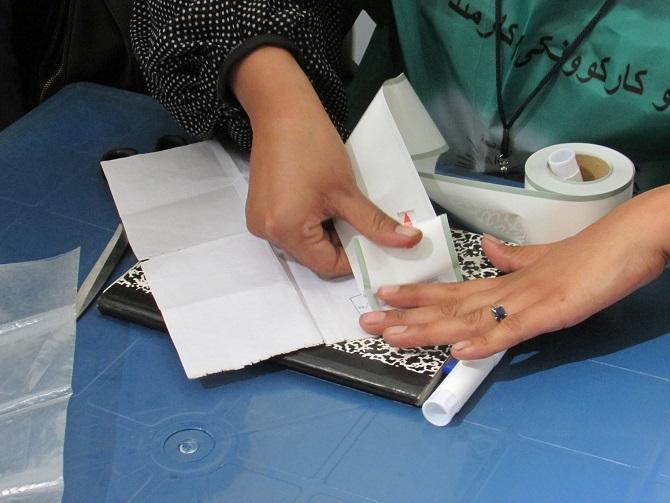JALALABAD (Pajhwok): Some families in remote areas of eastern Nangarhar province did not allow their female members to register as voters in the upcoming elections, residents and rights activists say.
There are also many families who allowed their women to register as voters in the upcoming parliamentary polls, but they are not permitted to vote for a candidate of their choice.
Insecurity, lack of awareness programs by the Independent Election Commission (IEC) and cultural restrictions are said to be the main reasons that keep women from participating in elections in Nangarhar.
According to the IEC, 818,000 people have registered as voters and 555 people as candidates in the Oct 20 Wolesi Jirga elections in Nangarhar. The registered voters include only 266,198 women.
Electioneering in the Wolesi Jirga elections is set to begin in next two days. The district council elections were also scheduled on the same date, but they delayed for some reasons.
Noor Saba, a resident of Surkh Rod district of Nangarhar, told Pajhwok Afghan News that her husband had registered himself in the voter registration process, but not allowed her to do so.
“The law has given us the right to enfranchise, our families should also give this right to us,” she said.
An elderly woman in Khogyani district, who wished to go unnamed, said she had participated in the last elections, when Taliban threatened and punished people for doing so. She said people did not allow their women to take part in the upcoming elections.
Shafiqa, a resident of Achin district, said only a limited number of women had registered as voters in their area.
She said many people in the district lacked awareness about elections and what they were concerned about was security and job. “Cultural restrictions do play a role in depriving women of their right to vote.”
Malak Sayed Akbar, a resident of Wadisa area of Sherzad district, said that only one woman from his family had obtained a voter card due to cultural restrictions.
“My sons allowed their mother only to take the voter card, they did not allow their sisters and wives to do so,” he said.
Muzamil Shinwari, a resident of Achin district, said the voter registration center was far away from their village and local people disliked sending females to take voter cards.
He said if there was security, the voter registration center would have been set up close to his house and he would have let his family women to take voter cards regardless of people’s views.
Women rights activists and ordinary women of Nangarhar say are worried about women in remote areas of the province because they are not allowed to take part in polls and are denied to vote for a candidate of their choice.
Jamila Sherzad, a women rights activist in Nangarhar, said even in urban areas, women were not allowed to take voter cards.
“There is no security problem in urban areas, people also have access to education and awareness, but many women were still not allowed to register in the voter registration process, this problem is more intense in rural areas” she said.
Hayatullah Talibzada, regional head for Afghan Women’s Network, said cultural restrictions, lack of awareness and insecurity were reasons that prevented women in remote areas from partaking in polls.
He also criticized the IEC for not providing people with awareness programs before launching the voter registration process.
Salsala Reshtyani, Nangarhar women’s affairs director, also expressed concern and said women even in urban areas were not allowed to participate in polls.
“In the past, many women would attend our programs and meetings but now only a limited number of women attend them despite we send them many requests, it is all because of insecurity which affects the polls,” he said.
Humaira Rafi, the provincial council deputy head, said insecurity had a negative impact on the election process, particularly on women’s participation.
“Insecurity is the biggest problem but cultural restrictions and lack of awareness also cause many women not to take part in polls”, she said.
Dr. Ahmad Daud Seddiq, IEC head for Nangarhar, confirmed problems in the public awareness, but cited cultural restrictions as main reason behind a limited turnout of females to register as voters.
On the other hand, Nangarhar governor’s spokesman, Attaullah Khogyani, said they had prepared plans for security of the Wolesi Jirga elections and there would be no security problem for people on the Election Day.








GET IN TOUCH
NEWSLETTER
SUGGEST A STORY
PAJHWOK MOBILE APP